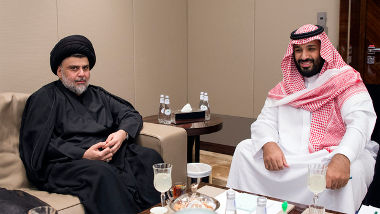The 'Kingmaker' Is Back - Muqtada Al-Sadr Wins The Election In Iraq
By Moon Of Alabama
May 14, 2018 "Information Clearing House" - On Saturday the people of Iraq voted for a new parliament.
The surprising winner is the Sairoon coalition of the Shia cleric Muqtada al-Sadr and the Communist Party of Iraq. According to the preliminary results it gained 54 parliament seats. There are a total of 320 seats in the Iraqi parliament and complicate multiparty coalitions are necessary to gain a majority and to elect a new Prime Minister.
The Fatah Coalition headed by Hadi al-Amiri came in second with 47 seats. The Nasr coalition of the current Prime Minister Haider al-Abadi is third with 42 seats. The party of former premier Maliki is lagging behind with 25 seats.
|
Are You Tired Of The Lies And Non-Stop Propaganda? |
Two, three or four of the larger blocks will have to find a coalition agreement that will also accommodate dozens of smaller parties with two or three parliament seats.
For outsiders Iraqi politics can be somewhat surprising. The female candidate of the Communist Party in the Shia holy city of Najaf, Suhad al-Khateeb, wears a Hijab. She is a scion of the Marjaiyya (religious establishment) family Saleem Adel. The Communist Party is allied with rabble rouser Moqtada al-Sadr. She won her parliament seat.
Muntaza Al Zaidi (vid), the Iraqi journalist who in 2008 threw his shoes at George W. Bush (vid) also won a seat.
This was the first election after the war against ISIS in Iraq has been won. It was feared that ISIS underground cells would interrupt the election by attacking candidates or voting locales but nothing significant happened.
With only 44.5% of the people voting the participation was abysmal. The last elections had participation rates above 60%. One reason might have been the generic election campaigns of the establishment parties. They lacked arguments on issues and policies. Fortunately sectarianism played only a small role with some Shia candidates winning large shares of Sunni votes and vice versa.
The low participation rates favored those parties and personalities with a large direct following. These "whale parties" will now have to make further coalition deals. It is quite possible that Prime Minister Abadi, who's party lost significantly, will stay in his office and lead a new coalition government in which he has less say. Muqtada al-Sadr will be the one who decides that.
The forty-four year old Muqtada al-Sadr is the son of a Grand Ayatollah who was assassinated under Saddam Hussein. The traditional political base of the al-Sadres is in the poor of Baghdad. Sadr city in Baghdad is named after his father. Muqtada and his followers in the Mahdi Army viciously fought the U.S. occupiers as well as sectarian Sunni gangs. In 2006 the U.S. planned to kill him and al-Sadr fled to Iran. U.S. media called him "anti-American" but Sadr is simply an Iraqi nationalist. He settled in Qom and tried to acquire higher theological credentials. Academically he was said to be a rather dim bulb and his studies went nowhere. He still lacks higher clerical credentials. Al-Sadr is disliked by the Iranian government and clerics as an unreliable and unthankful maniac.
During the U.S. occupation of Iraq we wrote quite a bit about Muqtada. Commentators at Moon of Alabama nicknamed him Mookie.
Over the last ten years Muqtada took the non-sectarian position traditionally associated with his father. He criticized the corruption of the political class but mostly from the sideline. Muqtada has lately partnered with the Iraqi communists and with secular candidates. His coalition campaigned on an anti-establishment note. His regained significance might help to clean up the patronage policies and corruption that long paralyzed Iraqi politics.
Muqtada has good contacts with the Saudis. His meeting with the Saudi Clown Prince Mohamad bin-Salman in July 2017 took place in an airport conference room. It lacked the usual gold and glitter of Saudi royalty. One wonders which side proposed the low drama location.

The Saudis will likely find, like everyone else before them, that Muqtada is uncontrollable. After this election neither the Saudis nor Iran nor the U.S. will have much political influence in Iraq. While Iran has strong economic and religious ties with Iraq its political meddling is much despised. The U.S. is seen as manipulative. Everyone believes that it created ISIS and Al-Qaeda and most Iraqis want all U.S. troops to leave.
Iraq has many serious problems. The economy is in bad shape. As the Turks build more and more upstream dams water in Iraq is getting scarce. The Kurds are not loyal to the Iraqi state. They think of vengeance after Baghdad took Kirkuk back from them. The Islamic State will try to come back. U.S. threats and machinations against Iran will make Iraqi foreign policy more complicate.
After the crushing experience of the last two and a half decades the people of Iraq truly deserve peace and a government that cares about their needs. Muqtada al-Sadr's strong position will help to form a less corrupt and more technocratic government that actually solves problems.
The next Iraqi government will try to keep Iraq out of the U.S.-Iran conflict. That will likely be in vain.
This article was originally published by "Moon Of Alabama " -=====
Join the Discussion
It is not necessary for ICH readers to register before placing a comment. We ask that you treat others with respect. Take a moment to read the following - Comment Policy - What Or Who is Information Clearing House and Purpose and Intent of this website: It is unacceptable to slander, smear or engage in personal attacks on authors of articles posted on ICH. Those engaging in that behavior will be banned from the comment section.

